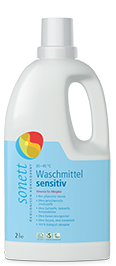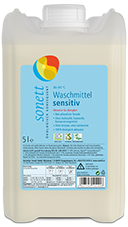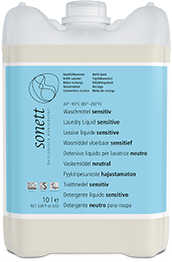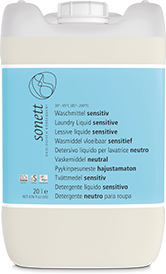
30° 60° 95° C (85–200 °F)
Laundry Liquid
sensitive
Component 1
in the Sonett Modular System
Note for people with allergies
- Purely vegetable surfactants
- Without any petrochemical ingredients
- Without fragrances, colourings
and complexing agents - No preservatives
- No enzymes
- No GMO
- Completely biodegradable

2 l
Flasche

5 l
Kanister

10 l
Kanister

20 l
Kanister
Application
Special product feature
Sonett’s particularly energy-saving method of saponification, the use of oils and essential oils derived from certified organic cultivation, and its good value for money as far as the laundry liquid’s washing performance is concerned are the outstanding features of this product.
Ranges of application
Suitable for white and coloured textiles made from cotton, linen, hemp, and fabric blends. Suitable for HE washing machines.
Dosage

Ingredients
Product declaration
Soap from rapeseed / sunflower oil, certified organically grown 5–15%
Sugar surfactant 5–15%
Coconut oil alcohol sulphate 5–15%
Vegetable alcohol (ethanol) 1–5%
Sulphated castor oil <1%
Citrate <1%
Water, swirled up to 100%
List of ingredients as per EC 648/2004
Aqua, potassium soap*, alkylpolyglucoside C8–C16 (coco glucoside, lauryl glucoside), sodium C8–C14 fatty alcohol sulphate (sodium octyl sulfate, sodium lauryl sulfate), alcohol, sulphated castor oil, sodium / potassium citrate
*certified organically grown
Origin and properties of the ingredients
In this liquid detergent, soap, sugar surfactant and fatty alcohol sulphate complement each other, thus intensifying their effect. To obtain the soap, rapeseed / sunflower oil, certified organically grown, is being saponified in a special process of saponification without applying heat from the outside, using potassium hydroxide solution. Soap as an active washing substance uniquely amalgamates all of the properties required for the washing process–the moistening, the dissolving, and absorbing of dirt. Soap is intensified in this effect by the sugar surfactant and fatty alcohol sulphate, which are obtained by the chemical reaction of the purely plant-based raw materials sugar, starch and coconut oil with acids. At the same time this combination neutralizes the soap's drawback, i.e. calcium soap being formed, which may precipitate on the laundry should the softener not have been properly measured. The alcohol which is obtained by fermenting plant-based starch serves to keep the detergent liquid, thus enabling a highly concentrated active washing substance. Sulphated castor oil, also called turkey-red oil, is obtained by castor oil reacting chemically with sulphuric acid. It intensifies the detergents fat-dissolving property.
Technical data
Density: 20 °C approx.1.027 g / cm³
68 °F approx. 0.036 oz / in³
pH value: 20 °C, 5 g / litre H₂O
68 °F, 0.18 oz / 34 fl oz US H₂O
approx. 8.5–9.5
At temperatures below 10 °C (50 °F), the product changes becoming slightly more solid and whitish; a phase which will pass, however, once the product is exposed to warmth and by shaking it lightly, if necessary.
Ecology
Biodegradability
Soap made from vegetable oils has one outstanding feature compared to all the other active washing substances, namely that, right after its use, it reacts chemically with the limescale always present in waste water, resulting in calcium soap, thus neutralising its surfactant effect on aquatic organisms (primary degradation). The calcium soap is then, by microorganisms, 100% degraded into carbon dioxide and water (secondary degradation). Despite the fact that during the manufacturing of sugar surfactants, coconut oil alcohol sulphate and sulphated castor oil, constituents are being extracted from the plant-based raw materials starch, sugar, and fat, they remain completely intact in their natural molecular structure. For this reason it is relatively easy for the microorganisms to 100% decompose these surfactants. Citric acids and their salts are an integral part of plant, animal and human organisms and are, therefore, rapidly and completely degraded into carbon dioxide and water by microorganisms present in nature. Soap, sugar surfactant, citric acid, coconut oil alcohol sulphate, and sulphated castor oil are classified as being readily biodegradable according to OECD guidelines.
Suitable for septic tanks and filtration systems.
Certification
CSE (Certified Sustainable Economics)
Packaging
Bottle, canister: PE
Cap: PE / PP
Label: PE
Outer carton: 100% recycling material




Follow us